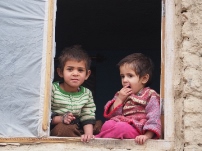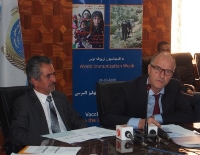 Over half a million children under the age of 5 will be immunized against measles in 3 high-risk provinces during Immunization WeekKabul, 26 APRIL 2015 – World Immunization Week was launched today in Afghanistan at an event attended by the Minister of Public Health and key national and international partners supporting immunization activities in the country. Immunization Week seeks to raise people’s awareness on the importance of vaccination and ensure people take action to receive all required life-saving vaccines.
Over half a million children under the age of 5 will be immunized against measles in 3 high-risk provinces during Immunization WeekKabul, 26 APRIL 2015 – World Immunization Week was launched today in Afghanistan at an event attended by the Minister of Public Health and key national and international partners supporting immunization activities in the country. Immunization Week seeks to raise people’s awareness on the importance of vaccination and ensure people take action to receive all required life-saving vaccines.
“Action must be increased to improve awareness and demand for immunization by communities and improve vaccination delivery services," said H.E. Dr Ferozuddin Feroz, Minister of Public Health.
"We need to close the immunization gap by integrating immunization with other health services and strengthening health systems to improve vaccine delivery so that we reach every child. We must also ensure that vaccines are accessible and affordable to all.”
Measles outbreaks are increasing in Afghanistan – 445 laboratory-confirmed cases have been reported in the first quarter of 2015, representing a significant increase from last year’s total of 581 cases. As part of this year’s Immunization Week, with the support of the European Commission's Humanitarian Aid and Civil Protection department, the Ministry of Public Health, WHO and UNICEF conduct a supplementary measles immunization campaign in Khost, Helmand and Kandahar provinces which are most at risk for measles outbreaks. Over half a million children aged 9-59 months will be immunized against measles and given 2 drops of the polio vaccine during the campaign. A nationwide measles campaign targeting around five million children under-5 will be conducted in two phases in May and July.
 WHO Representative Dr Rik Peeperkorn delivered a speech at the launch of Afghanistan's Immunization Week“Overall immunization coverage remains low with disparities throughout Afghanistan, particularly between rural and urban areas and secure and insecure zones. Around one fifth of Afghan women and children have never been immunized against diseases,” said Dr Rik Peeperkorn, WHO Country Representative. “We need to close this immunization gap. We encourage everyone to make sure that they and their family receive all required vaccines. Vaccines are not only for infants and children but they are for people of all ages to provide them with lifelong protection.”
WHO Representative Dr Rik Peeperkorn delivered a speech at the launch of Afghanistan's Immunization Week“Overall immunization coverage remains low with disparities throughout Afghanistan, particularly between rural and urban areas and secure and insecure zones. Around one fifth of Afghan women and children have never been immunized against diseases,” said Dr Rik Peeperkorn, WHO Country Representative. “We need to close this immunization gap. We encourage everyone to make sure that they and their family receive all required vaccines. Vaccines are not only for infants and children but they are for people of all ages to provide them with lifelong protection.”
“Wherever children are not immunized, children’s lives and the future of communities they live in are at risk. We need to reach out to all areas especially those that are not routinely reached to make sure that children everywhere receive the life-saving vaccines,” said Mr Akhil Iyer, UNICEF representative in Afghanistan.
Immunization is one of the most successful and cost-effective health interventions preventing illness, disability and death from vaccine-preventable diseases including pertussis, pneumonia, polio, rotavirus diarrhoea, tetanus and measles. Afghanistan’s under-5 mortality rate is among the highest in the world at 99 per 1000 live births – nearly 20% of all deaths in children under 5 are vaccine-preventable. Afghanistan remains one of the three polio-endemic countries globally – in 2014, 28 polio cases were reported, compared to 14 in 2013 and 37 in 2012.
Related links
Immunization Week in the Eastern Mediterranean Region


